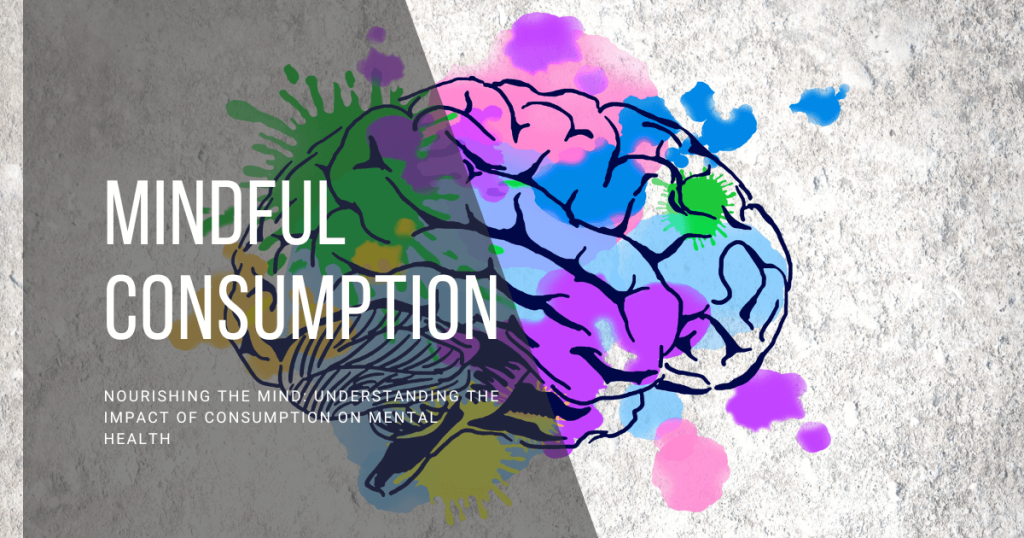In our fast-paced, information-driven world, the significance of our choices in molding our mental well-being can sometimes be overshadowed by the constant barrage of stimuli. Beyond the surface distractions lies a profound interconnection between our consumption patterns—whether related to food, media, or relationships—and our mental state. In the midst of this fast-paced environment, it’s crucial to take a step back and explore the intricate relationships between our dietary habits, media consumption, and social connections.
Much like a painter meticulously strokes a canvas, our lives are shaped by the decisions we make about what we consume. Each choice contributes to the spectrum of our emotions and the framework of our thoughts, collectively impacting our overall well-being. This influence extends beyond mere physical sustenance; it significantly affects our mental health. The intriguing concept of the gut-brain axis demonstrates that our dietary choices not only impact our bodies but also influence our mood, cognitive function, and mental balance.
However, the realm of consumption is not limited to food alone. In an era dominated by information flow, the media we engage with plays a pivotal role in shaping our perspectives and attitudes. Amid the sensationalism that often fills our screens, there’s room for mindful selection of media that informs and uplifts, contributing positively to our emotional responses. Equally important are the relationships we nurture. Our inner circle serves as a reflection of our values and self-worth. Cultivating meaningful connections fosters our well-being, while establishing boundaries safeguards our mental energy.
In the journey towards a harmonious mind, various tools are at our disposal. From therapeutic sounds that induce calmness to intentional dietary decisions, we hold the power to shape our mental landscape. Mindful consumption transcends individual choices; it encapsulates a philosophy that underscores our agency in fostering our mental health. By embracing choices aligned with resilience and growth, we become active architects of our own well-being. As we delve into the intricate connections between mindful consumption and mental health, we unveil the transformative potential inherent in each deliberate choice.
Food for Thought: The Gut-Mind Connection
The adage “you are what you eat” may have been dismissed as a simple saying, but as we delve into the labyrinthine intricacies of our biological systems, it becomes apparent that this age-old wisdom holds a remarkable truth—especially when it comes to the realm of mental health. Our journey into the link between what we consume and our mental well-being begins with the fascinating interplay between our gut and our mind—a connection that modern science is only just beginning to fully comprehend.
Emerging research has shed light on the profound relationship that exists between our gut health and our mental state. At the heart of this connection lies the enigmatic gut-brain axis, a complex and dynamic communication network that bridges the gap between our digestive system and our brain. This two-way conduit of information enables constant dialogue between these seemingly disparate realms, profoundly influencing our mood, emotions, and cognitive functions.
Imagine your gut as a second brain—one with a staggering number of neurons, often referred to as the “enteric nervous system.” This intricate web of neurons isn’t just responsible for digestion; it also plays an integral role in regulating emotions and sensations. It’s as if our gut has an emotional intelligence of its own, capable of sensing and responding to our internal state.
The gut-brain axis, with its intricate neural pathways and biochemical messengers, orchestrates a symphony of interactions that impact our mental health in ways we’re just beginning to grasp. From influencing the production of neurotransmitters like serotonin (often dubbed the “feel-good” neurotransmitter) to modulating inflammation levels that affect brain function, the gut exerts a powerful influence on our emotional well-being.
The foods we consume serve as the building blocks for this complex interplay. A diet rich in essential nutrients, fiber, and probiotics fuels the gut with the resources it needs to function optimally. Nutrients like omega-3 fatty acids, found in fatty fish and flaxseeds, have been linked to improved mood and cognitive function. Fiber, abundant in fruits, vegetables, and whole grains, serves as fuel for beneficial gut bacteria, promoting a healthy microbial environment. Probiotics, often found in fermented foods like yogurt and kimchi, introduce friendly bacteria that contribute to gut health.
Conversely, a diet high in processed foods, sugar, and unhealthy fats can disrupt this delicate balance. Such foods have been associated with inflammation and alterations in gut bacteria composition, potentially affecting mood and cognitive function. As we traverse the culinary landscape, it becomes evident that the choices we make about what we put on our plates extend far beyond our taste buds; they shape the very foundation of our mental well-being.
In this journey toward a harmonious gut-mind connection, consider your diet not just as a source of sustenance, but as a means of nourishing your emotional and cognitive vitality. A balanced diet not only supports your physical health but also cultivates an environment within your body that fosters positive mental states. As research continues to unveil the complexities of the gut-brain axis, the ancient wisdom of “you are what you eat” takes on a deeper significance—one that encourages us to approach our meals with mindfulness, embracing the profound impact they have on our journey to a balanced mind.
Navigating the Media Landscape: Impact on Perception
In today’s digital age, where information is abundant and screens dominate our attention, the media we engage with shapes more than just our entertainment—it significantly influences how we perceive the world. From the news headlines flashing before us to the carefully curated images on social media, the media’s impact goes beyond the surface, molding our perceptions, emotions, and ultimately, our mental health.
The effect of media on our well-being is especially relevant as negative news and sensationalism often dominate the landscape. Constant exposure to distressing stories of conflict and tragedy can have a tangible impact on our mental state. This consistent intake of alarming news can trigger heightened stress levels, anxiety, and even depression, perpetuating a cycle of worry and worst-case scenario thinking.
This outcome isn’t coincidental. Research shows that the content we consume has a direct effect on our brain chemistry. Negative news triggers stress hormones, mimicking a fight-or-flight response that was once essential for survival. However, in today’s media-saturated environment, this physiological reaction can lead to chronic stress.
Nonetheless, amidst this media saturation lies an opportunity for choice—empowering ourselves to be discerning consumers. Practicing mindful media consumption involves deliberately selecting the content that enters our mental space. It’s understanding that media isn’t just information; it’s a curator of our emotional experience.
Expanding the scope of your media intake can significantly impact your mental well-being. Seek out sources that prioritize balanced reporting, positivity, and content focused on solutions. Opt for news that educates and informs rather than incites fear. Engage with stories that foster empathy, comprehension, and optimism. And when in doubt, take a break from it all together and enjoy time in nature or meditating.
Establishing boundaries around media consumption is an act of self-care. Designate specific times for staying updated and engaging with social media, then disengage. Allotting your mind the space it requires to process information and focus on other aspects of life helps mitigate the negative effects of media saturation.
In a world abundant with narratives of both adversity and triumph, remember that you have control over your media experience. By selecting content that enriches your perspective, uplifts your mood, and enhances your understanding, you foster a media environment that bolsters your mental well-being. As you navigate the media landscape, embrace the role of a conscious consumer—one who curates an environment conducive to a balanced mind and a resilient spirit.
Music’s Impact on Mental Well-being: Exploring Therapeutic Soundscapes
In the realm of human experience, music stands as a universal language, capable of transcending boundaries and touching hearts across cultures and generations. Its significance extends beyond mere entertainment, as music holds the power to evoke emotions, set moods, and transport us to different emotional landscapes. However, its influence isn’t confined to pleasure alone—music possesses an intrinsic therapeutic potential that significantly impacts our mental well-being.
The connection between music and emotions is deeply ingrained in our lives. Each melody, rhythm, and arrangement has the ability to evoke a range of feelings, from joy and nostalgia to introspection. Yet, beyond its emotional impact, music also wields influence over our cognitive and physiological states.
While mainstream music offers enjoyment and can elevate our mood, it can also come with negative influences that affect the way we think about ourselves and others. Conversely, delving into alternative auditory experiences opens up a realm of distinctive benefits for mental health. Consider binaural beats, an emerging concept that capitalizes on the brain’s response to frequency differences between ears. These beats are believed to promote relaxation, heighten concentration, and facilitate meditation by synchronizing brainwave activity.
Sound baths, rooted in ancient practices, involve immersing oneself in a blend of sounds from instruments like singing bowls and gongs. This immersive sound environment is thought to induce meditative states, reduce stress, and even release pent-up emotions.
White noise, a consistent background sound like static or a waterfall, proves effective in masking distractions and enhancing focus. Amidst the influx of sensory stimuli, white noise acts as a shield, creating an auditory backdrop conducive to mental clarity.
Classical music, renowned for its emotional depth and intellectual stimulation, also contributes to mental well-being. The intricate compositions of renowned composers like Mozart and Beethoven, along with the soothing harmonies of Chopin, have been shown to reduce stress, lower blood pressure, and enhance cognitive function.
Incorporating these alternative auditory experiences into daily routines can significantly support a balanced mental state. Whether it involves engaging in a sound bath to unwind, integrating binaural beats into meditation, or using white noise for focused work, the soundscape choices you make directly impact your mental landscape.
By embracing therapeutic soundscapes, you’re tapping into an ancient form of healing that transcends cultural and language barriers. The vibrations that resonate within you possess the potential to harmonize mind, body, and spirit, creating a symphony of well-being. As you navigate this auditory journey, consider the melodies that resonate with your essence, allowing them to guide you toward a calmer, more centered existence.
The Role of Social Circles in Shaping Well-being
In the intricate fabric of our lives, the individuals we select to accompany us on our journey serve as influential threads that interweave patterns of impact, inspiration, and personal development. The relationships we nurture—be they friendships, connections, or bonds—hold the capacity to shape our perspectives, affect our mindset, and profoundly influence our overall sense of well-being. The familiar adage, “you become the average of the five people you hang around most,” underscores the potent impact that our social circles exert on our pursuit of a balanced and fulfilling life.
Inherent to our nature as social beings, our interactions not only fulfill our need for connectivity but also play an instrumental role in shaping our identities and emotional landscapes. The individuals we surround ourselves with extend beyond mere companionship; they act as reflective mirrors, offering glimpses into our values, aspirations, beliefs, and even our limitations.
Consider a social circle comprised of friends who radiate positivity, ambition, and empathy. In their presence, one often finds themselves invigorated, driven, and motivated to reach new heights. This phenomenon is far from coincidental—it’s an embodiment of the energies exchanged within social circles. The attitudes, behaviors, and cognitive patterns of those we associate with construct an environment that either nurtures our growth or hampers it.
The sway of our social networks extends its influence to our mental well-being as well. Prolonged exposure to negativity, criticism, and toxic behavior can corrode self-esteem, amplify stress, and potentially contribute to feelings of anxiety and depression. Conversely, companions who uplift, validate our emotions, and foster personal advancement wield the potential to significantly bolster our overall well-being.
Creating boundaries around relationships that fail to contribute to our well-being is not solely an act of self-preservation but also a testament to our commitment to leading lives brimming with purpose. As we navigate the intricate dance of human connection, it is crucial to discern relationships that propel us forward from those that drain our energy.
Prioritizing mental health necessitates surrounding oneself with individuals who respect boundaries, champion personal growth, and celebrate accomplishments. This entails acknowledging when a relationship has become one-sided, detrimental, or misaligned with our values. Opting to distance oneself from individuals who consistently emanate negativity demonstrates a resolute step toward prioritizing personal well-being.
In the bigger story of life, the people we are close to can either make our lives full of happiness and peace, or they can make things difficult. By deliberately cultivating connections that elevate our spirits and align with our aspirations, we craft a story marked by optimism, mutual support, and continuous development. Embrace your ability to create your social environment, allowing it to mirror the empowered, balanced, and resilient individual you aspire to become.
Shaping Your Mental Well-being
In the realm of nurturing your mental well-being, every decision contributes to the larger picture of your inner world. Your journey is characterized by these choices, each akin to a brushstroke on the canvas of your mind. These actions extend beyond the present moment, carving the lasting contours of equilibrium, resilience, and contentment.
1. Prioritizing Physical Nutrition:
Embrace the understanding that nourishing your body is not solely about appeasing hunger. Opt for whole foods, emphasizing vitamins, minerals, and nutrients to support both bodily and cognitive functions. An emphasis on gut health through fiber-rich foods and probiotics facilitates a stronger gut-brain connection, while adequate hydration remains pivotal for maintaining cognitive processes.
2. Selective Media Consumption:
In a digital era inundated with information, take a discerning approach to the media you engage with. Choose content that is informative and uplifting, fostering a constructive environment for empowerment. Establish boundaries against negativity and sensationalism, allowing space for positivity and clarity to flourish.
3. Exploring Sound’s Therapeutic Role:
Delve into the world of sound for its potential to enhance mental well-being. Binaural beats can contribute to relaxation and focus, sound baths offer a chance to unwind, and classical music has been proven to offer mental clarity. These auditory experiences can be integrated into your routine for moments of tranquility and mental rejuvenation.
4. Consciously Building Relationships:
Recognize the influence of the company you keep on your mental state. Surround yourself with individuals who encourage growth, provide support, and motivate you to strive for your best self. Simultaneously, establish boundaries with those whose presence may hinder your well-being, reinforcing the importance of prioritizing mental health.
As you navigate the pathways to mental well-being, each decision acts as a building block in the blueprint of your inner landscape. Your journey is characterized by these informed choices that collectively shape a life of balance, self-awareness, and vitality. By remaining mindful of the impact of your actions, you pave the way for a fulfilled life where well-being becomes an integral aspect of your identity.
Visit https://reggiedford.com to learn how I can help in your journey of mindful consumption.







